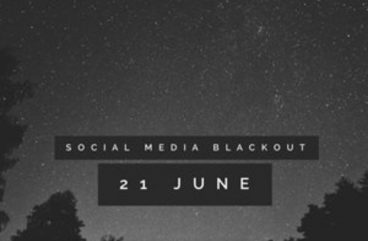 While we in America vlogged, posted, and tweeted away this week, in South Africa a daring revolution with vast implications was launched.
While we in America vlogged, posted, and tweeted away this week, in South Africa a daring revolution with vast implications was launched.
Called #SocialMediaBlackout, it was started by social media platform users who were tired of being pressures to pay rates for data transfer over the Internet. Reportedly, musician and activist Ntsiki Mazwai begged fellow South Africans to log off for one day, June 21st, and not buy data to pressure mobile providers to provide it for free.
The reason for #SocialMediaBlackout was a result of high costs of mobile broadband with respect to income. The International Telecommunication Union explains that South Africa is 85th out of 178 countries for mobile broadband prices, based on 500 MB of pre-paid mobile data.
The BBC writes that “The ITU puts the monthly cost at $7.76 (£6.1), or about 1.37% of personal income. In Niger, the cost is nearly $8 – but that represents almost a quarter of incomes.”
The United States has the highest costs for Internet access per month, yet speeds are slow according to a PBS article from 2015.
If you consider the fact that many entertainment programs that are on television are now streamed, many Americans pay a triple price for cable, phone, and Internet. That dynamic, with respect to near flat-lined income growth, has caused many, particularly younger content consumers to “cut the cord”, doing away with cable boxes, which also provide Internet access, and electing to go just with their smartphones.
The “cut the cord” act has had an impact on the bottom line of companies like ESPN, or Enterprise Sports Network. So many have canceled cable service, that ESPN has laid off a number of reporters and anchors, some who reached celebrity status in the sports they covered.
That has placed increasing pressure on broadband service providers to keep costs at reasonable levels. But the reason they are still considered to high with respect to income is because of the extremely few number of broadband service providers – and all of which are private.
To counter that, cities like Chattanooga, Bristol, Lafayette, Cedar Falls, and Wilson, North Carolina have created their own municipal broadband services to provide affordable competition. But they are still too few in number to make a real dent in the problem.
These price pressures, which have continued to present day 2017, could lead America to have a #SocialMediaBlackout of its own. Which leads to this question…
Did the South African #SocialMediaBlackout work?
The answer to that question depends on who you talk to. Some observed that the fact that #SocialMediaBlackout was a Twitter trend proves it did not. But that view comes with an apparent ignorance of the fact that people in the rest of the World who knew about the #SocialMediaBlackout were also tweeting about it – South Africa is not the whole World, even with broadband access location differences.
It is also not in the best interests of broadband service providers to allow the World to think #SocialMediaBlackout worked. So, it’s fair to reason that some tweeting that it did not work may represent those interests who didn’t want it to.
But one fact remains: regardless of the level of people deciding to get off line for a day, the idea is out there, now. If price pressures worsen, a natural #SocialMediaBlackout could happen because users can’t afford the cost, and that would be bad for everyone.
Stay tuned.
Zennie Abraham | Zennie Abraham or “Zennie62” is the founder of Zennie62Media which consists of zennie62blog.com and a multimedia blog news aggregator and video network, and 78-blog network, with social media and content development services and consulting. Zennie is a pioneer video blogger, YouTube Partner, social media practitioner, game developer, and pundit. Note: news aggregator content does not reflect the personal views of Mr. Abraham.